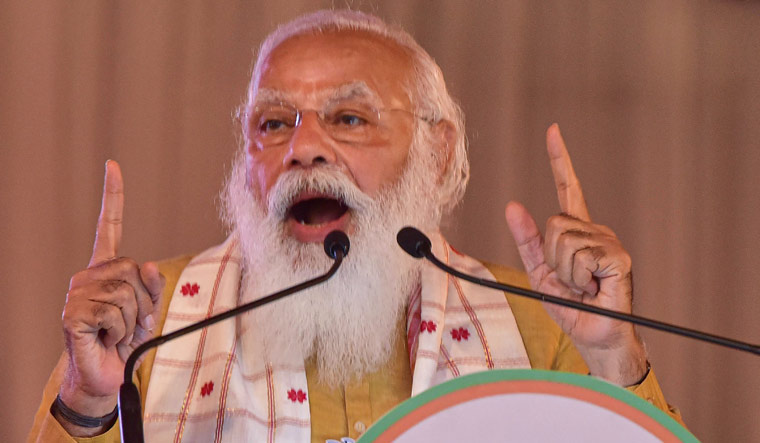The Centre's Aatmanirbhar Bharat policies paved way for state governments to borrow more during the last financial year, notwithstanding the pandemic, Prime Minister Narendra Modi said on Tuesday. "It would perhaps pleasantly surprise you that states were able to raise an extra Rs 1.06 lakh crores in 2020-21. This significant increase in availability of resources was made possible by an approach of Centre-State bhagidari," Modi noted in his LinkedIn blog post titled Reforms by Conviction and Incentives.
The prime minister's blog comes in the backdrop of the Centre relenting to borrow the amount of shortfall attributable to the implementation of GST and pass it on to states on a back-to-back basis in October last year. As a result, it agreed for additional borrowing of 1 per cent of their GSDP (Gross State Domestic Product) towards the implementation of four critical reforms. As per the plan, Rs 1,06,104 crore was borrowed by the Central government on behalf of the state governments through the special borrowing window at an weighted average interest rate of 4.8842 per cent to meet the GST compensation shortfall. The whole amount was released by March this year.
The prime minister also emphasised on the government's efforts to implement the four critical reforms mandated for the transfer of funds. "The first reform under the ‘One Nation One Ration Card’ policy required state governments to ensure that all ration cards in the State under the National Food Security Act (NFSA) were seeded with the Aadhaar number of all family members and that all Fair Price Shops had Electronic Point of Sale devices. The second reform, aimed at improving ease of doing business, required states to ensure that renewal of business-related licences under 7 Acts is made automatic, online and non-discretionary on mere payment of fees. The third reform required states to notify floor rates of property tax and of water & sewerage charges, in consonance with stamp duty guideline values for property transactions and current costs respectively, in urban areas. The fourth reform was introduction of Direct Benefit Transfer (DBT) in lieu of free electricity supply to farmers," he stated.
While 13 states implemented at least one component, six states implemented the DBT component. As a result, Rs. 13,201 crore of additional borrowings was permitted.
Overall, 23 states availed of additional borrowings of Rs. 1.06 lakh crores out of a potential of Rs. 2.14 lakh crores. As a result, the aggregate borrowing permission granted to states for 2020-21 (conditional and unconditional) was 4.5 per cent of the initially estimated GSDP, he further added.
"For a federal country of continental dimensions, finding policy instruments at the national level to promote reforms by state governments is indeed challenging. But, we had faith in the robustness of our federal polity and we moved ahead in the spirit of Centre-State bhagidari," the PM stated further.
He added that each of the reforms under the Aatmanirbhar Bharat scheme was linked to improving the ease of living to the public and particularly the poor, the vulnerable, and the middle class. They also promoted fiscal sustainability, he said. "India has seen a model of ‘reforms by stealth and compulsion’. This is a new model of ‘reforms by conviction and incentives’," he said.




